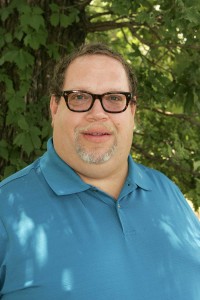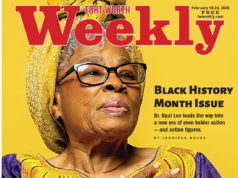Two events important to the LGBT community — one national, one local — brought a renewed sense of urgency to the fight for trans employment protections and health coverage. They catapulted Van Fleet-Kujala and Wynn onto the front lines of North Texas trans activism.
The national event became a moment of soul-searching for the entire LGBT movement. In 2007, after years of hard-fought battles, the U.S. House of Representatives came close to passing a version of ENDA (the Employment Non-Discrimination Act), a federal provision that would ban discrimination on the basis of sexual orientation and gender identity (i.e. transgender people). The LGBs — lesbians, gays, and bisexuals — passed muster with conservative members of Congress, but House Republicans balked at including trans people in the bill. The Human Rights Campaign, arguably the nation’s leading gay advocacy group, initially backed a version of the bill that lacked protections for transgender people, reasoning that any legislation was a qualified victory, and perhaps trans folks could be added later.

This prompted the resignation of all trans members from the HRC board. It also brought to the fore a long-simmering suspicion that transgender people’s struggles had always been considered a little separate, a little less important than those of lesbians and gays. It radicalized many members of the trans community, moving them to begin speaking out on their own issues. HRC soon backtracked and announced its support of a trans-inclusive version of the bill. It didn’t pass the House then (and still hasn’t), but it made clear that there was a fissure that needed to be dealt with.
Van Fleet-Kujala, a newly minted LGBT activist who’d just started her transition, was so heartbroken over what she saw as HRC’s betrayal that she placed a wide strip of black tape across the Human Rights Campaign sticker on her car.
The HRC/ENDA brouhaha “really galvanized the trans rights movement,” said Wynn. “Our allies [at HRC] said, ‘We’ll leave you behind now, but we promise to come back for you.’ It usually doesn’t work that way. I think a lot of trans people heard a message [from LGB folks] that said, ‘You’re too different, too strange for us. You’re hurting the movement.’ In fact, transgender people started the modern gay rights movement,” he added, referring to the oft-cited fact that drag queens were among the first to protest in the streets after New York City cops’ infamous raid at the Stonewall Inn in 1969.
A similar event in Fort Worth, four decades after Stonewall, helped galvanize the local trans rights movement –– the botched 2009 raid on the Rainbow Lounge, which fell smack on the 40th anniversary of the Stonewall riots. Although no transgender people were injured in the Fort Worth event, activists who responded to the raid with demands for better protections for local LGBT citizens were determined not to leave trans people out this time.
“There has always been a lot of misunderstanding inside and outside the LGBT community about the ‘T,’ ” said Henderson, who co-founded the Fairness group in the wake of that raid. “Sexual attraction and gender identity are not the same thing. Some lesbian and gay folks who haven’t met gender norms because of their sexual orientation have been persecuted for it. But the folks who are transgender have often stood out in an even more public way [because of their gender expression]. The opportunities for persecution have often been greater for them. We learned from the HRC/ENDA flap –– you don’t leave people behind.”
Working with the city manager’s office, Fairness Fort Worth created a Diversity Task Force that included both Henderson and Van Fleet-Kujala. They drafted a series of proposals that included diversity training for all city workers, partnership benefits and protection against discrimination for LGBT employees, and, crucially, the broadening of the city’s non-discrimination ordinance to cover transgender people.
The mayor and city council seemed a bit shell-shocked by the international news coverage that the Rainbow Lounge event received. In fairly short order, they adopted most of the Diversity Task Force’s recommendations. A transgender plank was added to the city’s anti-discrimination ordinance, explicitly covering “transgender, gender identity, and gender expression.”
The glaring exception to the success story was city healthcare coverage for reassignment surgery. That benefit has yet to be approved, despite ongoing efforts by its advocates. Some council members remain skeptical about covering surgical procedures that they suspect are equivalent to cosmetic surgery. In tight budget times, their reasoning goes, gender reassignment for a tiny minority is not a priority.
Rafael McDonnell, a Fort Worth resident who serves as communications and advocacy manager for the LGBT organization Resource Center, isn’t surprised that trans health coverage sticks in some people’s craw. Since he joined the Resource Center in 2008, McDonnell, who is gay, has been at the forefront of efforts to lobby government and business groups to include LGBT protections. He’s worked successfully to get trans folks covered in employment and health policies everywhere from DART to Southern Methodist University to Dallas County.
“If there’s a line that runs through all of this [his advocacy work], it’s the need for education,” McDonnell said. “A lot of people understand what sexual orientation is, but they have trouble wrapping their heads around concepts like gender identity and gender expression. Sometimes even our allies have trouble with this distinction: A person’s romantic and sexual inclinations are different from the gender they identify as.”
As a case in point, McDonnell cited Dallas County commissioners’ decision in 2011 to finally add sexual orientation to their non-discrimination policy. Explicit protections for trans people were not included, McDonnell said, and there was some resistance from even generally supportive county commissioners. They thought “sexual orientation” somehow automatically included protections for, say, a trans person who was born male but now presents herself, in name and appearance, as a woman. It doesn’t.
To get the ball rolling on trans protections for Dallas County employees, McDonnell and Resource Center rallied the North Texas trans community. For five weeks in a row, transgender people of all types — men and women, old and young, from various races and ethnicities — came to talk publicly to commissioners about their experiences. Van Fleet-Kujala was among them.
“We put a face and a personal story to concepts like ‘transgender’ and ‘gender identity,’ and it turned out to be the best strategy,” McDonnell said. “One trans woman addressed the council about how she delayed her transition [from her male birth sex] because her wife was dying of cancer. Some of the commissioners said that affected them particularly.” In 2011 Dallas County added trans status alongside sexual orientation as a protected class.
Henderson recently got Fort Worth to clarify its insurance policies on medical treatments that trans people undergo. The city now has a “cross-gender” policy where certain basic medical procedures are concerned: For instance, estrogen treatments and breast exams long available to other women are now also covered for trans women, just as testosterone treatments would be approved for all men, including those who are transgender.
Henderson said Fairness Fort Worth has not given up on lobbying the city to cover the transition surgery, as more progressive burgs like Boston, Seattle, and San Francisco already do. Still, most U.S. cities lag behind the federal government on this topic. In May, officials of the U.S. Department of Health and Human Services announced that gender reassignment surgery would be covered under Medicare.
“[Fairness Fort Worth] is in this for the long haul,” he said. “You can’t just flip a switch and have everybody land on your side of the aisle. You win over a few people at a time, and you make a little more progress each time.”
********
David Wynn continues to preach to his predominantly LGBT flock about living an authentic life — being true to who you were meant to be regardless of what others say or do. As a trans man finally living the male identity he remembers always feeling, Wynn is more confident about imparting those lessons. But he does wish people could gain a little perspective on the transgender issue and realize that, to varying degrees, most folks wrestle with society’s expectations and even their own bodies.
“Being transgender is, in a way, a universal experience,” he said. “We still live in a patriarchal culture that has hyper-masculine expectations of straight men, gay men, and trans men. Trying to live up to those standards causes a lot of pain. It’s the same thing for women, who’re constantly made to feel, ‘Am I feminine enough? Am I attractive enough?’ That’s where the body image issues start.”
He chuckled. Many people “now routinely receive hormone treatments and surgically alter the bodies they were born with just to meet those pressures,” Wynn added. “When you’re talking about gender, the pressure to fit in is huge for pretty much everyone.”












“I knew at a very young age, around 5, that people were interpreting me as female because of my physical body. But in my heart and mind, I related to the male experience from the start.”
You go, David! Kudos for discovering your special trans male identity. As a true woman, I for one LOVE IT when people “interpret me as female” and pay me less, shame me for my body, deny me opportunities, and consider me stupid! No actual woman would prefer “the male experience” to those appropriate to the female gender. Do tell us about “the male experience,” David! Which manly pursuit do you most enjoy? Being a lady, I like wearing pink, cleaning house, and being catcalled, myself. Tee hee!